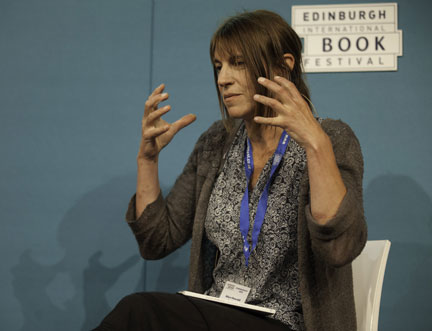More articles Friday 19 August 2016 4:00pm
Alice Oswald Speaks Nature's Secret Language

We might tend to think of poets as rather pallid, introspective, indoor types, given to sleeping late and evading the light – but not so Alice Oswald. This multiple award-winner garnered material for her latest work by rising in the small hours to witness the sunrise, and finding ways to observe the secret lives of grasshoppers. “I thought, rather than going into my shed and dragging things out of my head, I’m going to take down by dictation what happens at dawn,” she told her Book Festival audience today. As for the grasshopper thing, that involved “hours and hours of putting myself at grasshopper level.” She noted that there might be a particular affinity at play there: “Plato thought dead poets turned into grasshoppers. So I’m still hoping…”
Such reference points reveal Oswald’s dual origins as a gardener – she still gardens professionally one day a week – and a trained classicist. Her new collection Falling Awake also combines these interests. It comprises a long work commissioned by the Southbank Centre in 2014 and based upon the Greek myth of Tithonus, who falls in love with the dawn; and shorter works circling themes of nature and decay, some of which she performed on the Book Festival stage. The tone of the collection, she said, represents “my wish to become an insect – to be able to speak not in my own voice, but the voice of the atmosphere or the voice of water.” Yet the less airy matter of rot also features heavily: like any countryside dweller, Oswald is familiar with dead things, and intrigued by “how much life there is in a rotting body.”
No less anchored in the physical is Oswald’s whole conception of poetry, which is inspired by the oral tradition. Poems meant to be remembered and spoken aloud have, she said, a particular force. “You could say all sorts of things that are clever or sentimental, but only a certain rhythm is going to be memorable,” she said. Speaking her own words out loud is therefore and indispensable part of the composition process: “I’m afraid a lot of muttering goes on.”
There was no muttering in her own poised, ringingly clear performance, in which tiny, invisible moments in the lives of plants and creatures were amplified to sharp, striking and sometimes funny effect. Flies ask each other, “What dirt shall we visit today?”; a vixen barking at night is “hungrily asking in the heart’s thick accent.” A meditation on a dead swan, vividly compared to a wrecked aircraft, includes the line, “What a waste of detail” – but it’s evident nothing is lost on this clear-eyed sharer of nature’s secrets.
- 2026 Festival:
- 15-30 August
Latest News
 Major new partnership with Celtic Connections
Major new partnership with Celtic Connections



